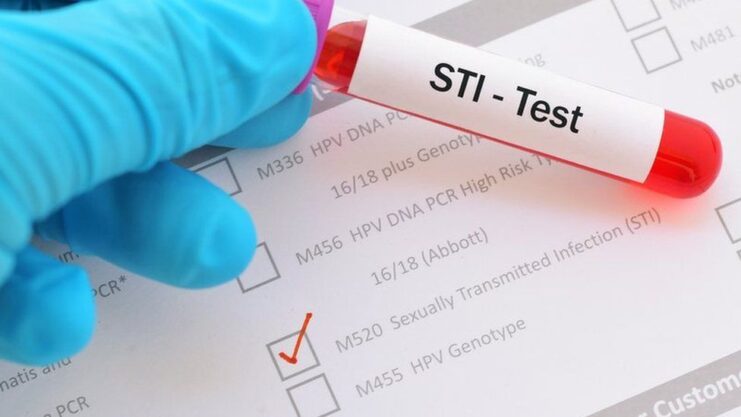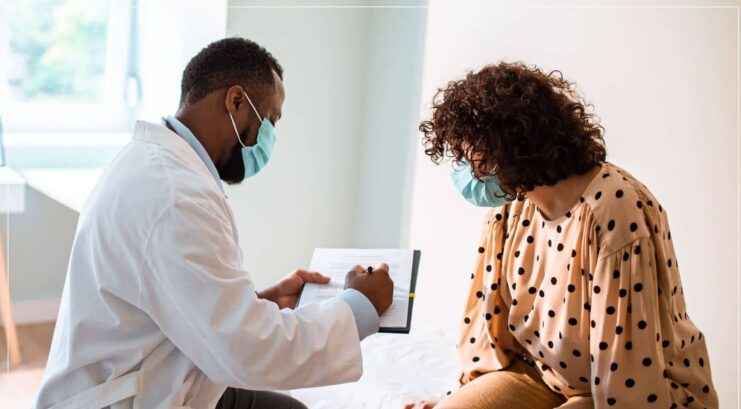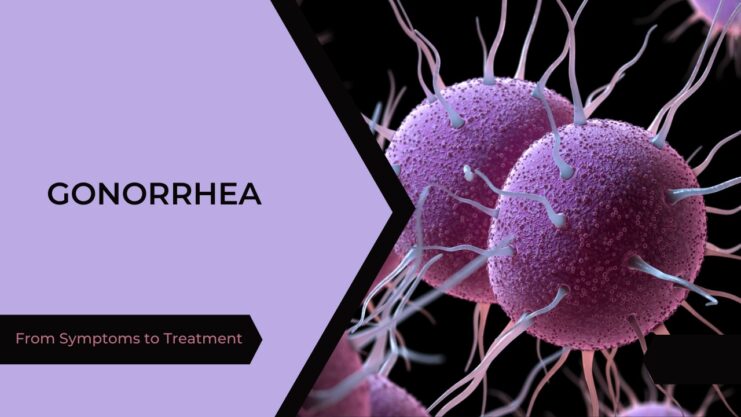Gonorrhea is a sexually transmitted infection caused by the bacteria Neisseria gonorrhea. It is one of the most common sexually transmitted infections worldwide, with over 87 million new cases estimated in 2016.
Gonorrhea can be transmitted via vaginal, oral, or anal sex, and can infect the cervix, urethra, rectum, and throat. It can also be transmitted from a pregnant woman to her baby during childbirth.
The symptoms of gonorrhea can vary, and in many cases, the infection can remain asymptomatic. However, when symptoms do occur, they typically include abnormal discharge, pain during urination, and pain during sex.
Gonorrhea can be treated with antibiotics, but drug-resistant strains are becoming more common. It is important to get tested if you think you may have been exposed to gonorrhea, as early detection and treatment can help prevent complications.
Risk factors:
Gonorrhea is primarily transmitted through sexual contact, including vaginal, oral, and anal sex. It can also be transmitted from a pregnant woman to her baby during childbirth. Individuals who engage in unprotected sex, have multiple sexual partners or have a sexual partner who has a sexually transmitted infection are at an increased risk of contracting gonorrhea. Men who have sex with men are also at an increased risk of gonorrhea.
Other risk factors for gonorrhea include having another current sexually transmitted infection, a new sexual partner, and unprotected sex. Adolescents and young adults are also at an increased risk of gonorrhea, as are individuals who use drugs or alcohol before sex. It is important to practice safe sex and get tested regularly if you are at risk of gonorrhea.
Symptoms:

The symptoms of gonorrhea can vary depending on the site of infection. In women, up to 90% of gonorrhea infections affect the cervix. Symptoms may include abnormal vaginal discharge, pain during sex, lower abdominal pain, and abnormal vaginal bleeding.
In men, symptoms may include penile discharge, pain during urination, and pain in the testicles. Both men and women can also develop gonorrhea infections in the rectum or throat, which may be asymptomatic or cause discharge, itching, or pain.
It is important to note that gonorrhea can also be asymptomatic, meaning that individuals may not experience any symptoms at all. This makes regular testing an important part of maintaining sexual health, especially for individuals who are at an increased risk of gonorrhea.
In women:
- Abnormal vaginal discharge – thin, purulent, yellow or green
- Mild odor
- Pain passing urine
- Pain during sex
- Lower abdominal pain
- Abnormal vaginal bleeding (in between periods or after sex) – rare
In men:
- Penile discharge – white, yellow, green and occasionally blood-tinged
- Pain passing urine
- Pain in the testicles – rare
In both men and women:
In the rectum – usually no symptoms, but may cause discharge, itch or pain.
In the throat – usually no symptoms
In the eyes – can present with pain, swelling, irritation or discharge (conjunctivitis)
Click here for more info on Throat Gonorrhea
Click here for more info on Rectal Gonorrhea
Importance of Early Testing and Treatment:

Early detection and treatment of gonorrhea is essential to prevent complications and to reduce the spread of the infection. Regular testing for sexually transmitted infections, including gonorrhea, is important for sexually active individuals, especially those with multiple sexual partners or who engage in high-risk behaviors.
If you suspect that you may have been exposed to gonorrhea or are experiencing symptoms, it is important to get tested and treated as soon as possible. This will not only help prevent complications but also help reduce the spread of the infection to others.
Treatment:
gonorrhea can be treated with antibiotics and the 1st line of antibiotic use is rocephine (ceftriaxone). However, gonorrhea is becoming more difficult to treat due to drug-resistant strains. Commonly, individuals with gonorrhea can also have other STD such as chlamydia; hence antibiotics are usually given to treat both gonorrhea and chlamydia.
As for most STD, treatment of an individual infected with gonorrhea also involves treating their sexual partner. After treatment of gonorrhea, it is recommended to get tested again to ensure clearance of gonorrhea (increasing incidence of drug resistance), relapse or re-infection.
It is recommended to refrain from having sex until both you and your sex partner have completed treatment or as advised by your doctor.
Complications:
1% of individuals with untreated gonorrhea can go on to develop widespread gonorrhea infection resulting in skin pustules, infection of the joints (fingers, wrists, toes, ankles, knees) brain or heart valves.
In men, untreated gonorrhea can give rise to inflammation of the epididymis (the tube that carries the sperm), prostate and urethra. Rarely this can cause subfertility.
In women, pelvic inflammatory disease (PID) is generally the most feared complication of gonorrhea, with up to 20% of women with gonorrhea having a retrograde spread of infection from the cervix towards the uterus, fallopian tubes, ovaries etc leading to PID. Chronic complications of PID, such as fallopian tubal factor subfertility, ectopic pregnancy (pregnancy outside the uterus), and chronic pain, may occur in up to 25% of affected patients.
Other rare complications include septic abortion, chorioamnionitis (infection of amniotic fluid) during pregnancy, and infant or adult blindness from an eye infection.
Individuals with gonorrhea are more susceptible to HIV and also increase risk of co-infection with other STDs, especially chlamydia.
Correct used of latex condoms can reduce the risk of contracting or spreading gonorrhea.
If you think you are at risk of contracting gonorrhea, it would be advisable to get tested as it is a simple test (in men – urine test, in women – vaginal swab test) and to get treated early.
Throat and Rectal gonorrhea:

Gonorrhea can infect the throat and rectum in addition to the genital and urinary tracts. Throat gonorrhea is usually asymptomatic but can cause pain, swelling, irritation, or discharge in some cases. Rectal gonorrhea may also be asymptomatic but can cause discharge, itching, or pain. Both throat and rectal gonorrhea can be transmitted through oral and anal sex, respectively.
It is important to get tested for throat and rectal gonorrhea if you are at risk of contracting the infection. This is especially true for men who have sex with men, who are at an increased risk of rectal gonorrhea. Treatment for throat and rectal gonorrhea is the same as for genital and urinary gonorrhea.
Complications of Untreated gonorrhea
Untreated gonorrhea can lead to a range of complications, particularly in women. Pelvic inflammatory disease, which occurs when the infection spreads from the cervix to the uterus, fallopian tubes, and ovaries, is a particularly concerning complication. This can lead to chronic pain, infertility, and ectopic pregnancy. In men, untreated gonorrhea can cause inflammation of the epididymis, prostate, and urethra, which can lead to subfertility in rare cases.
Untreated gonorrhea can also cause widespread infections, resulting in skin pustules, joint infections, and infections of the brain and heart valves. Additionally, individuals with gonorrhea are at a higher risk of contracting and transmitting other sexually transmitted infections, including HIV.
Prevention

Practicing safe sex is the best way to prevent gonorrhea. This includes using condoms or dental dams during oral, vaginal, and anal sex, and limiting sexual partners. Regular testing for sexually transmitted infections, including gonorrhea, is also an important part of prevention, particularly for individuals who engage in high-risk sexual behaviors.
In addition to these preventative measures, reducing alcohol and drug use before sex, as well as choosing sexual partners carefully, can help reduce the risk of contracting gonorrhea.
Frequently Asked Questions
Q: Can gonorrhea be cured?
A: Yes, gonorrhea can be cured with antibiotics. However, drug-resistant strains are becoming more common, making early detection and treatment even more important.
Q: How is diagnosed?
A: Gonorrhea can be diagnosed through a simple test, which may involve a urine sample or a swab of the affected area, depending on the site of infection.
Q: What are the long-term effects of gonorrhea?
A: Untreated gonorrhea can lead to a range of complications, including pelvic inflammatory disease, subfertility, and the spread of infection to other parts of the body. Regular testing and early treatment can help prevent these complications.
Q: Can I get gonorrhea from oral sex?
A: Yes, gonorrhea can be transmitted through oral sex, leading to infections in the throat and other parts of the body.
Q: Can I get it if my partner has no symptoms?
A: Yes, gonorrhea can be asymptomatic in some individuals, meaning that they may not experience any symptoms of infection.
Q: How can I prevent gonorrhea?
A: Practicing safe sex, including using condoms or dental dams, limiting sexual partners, and getting regular testing for sexually transmitted infections, can help prevent gonorrhea.
Q: How soon after exposure can be detected?
A: gonorrhea can be detected within a few days to a few weeks after exposure, depending on the site of infection.

Conclusion:
Gonorrhea is a common sexually transmitted infection that can lead to a range of complications if left untreated. However, early detection and treatment can help prevent these complications and reduce the spread of infection to others. Practicing safe sex, getting regular testing for sexually transmitted infections, and seeking treatment as soon as possible if you suspect that you may have been exposed to gonorrhea are important steps in preventing and managing this infection.
Related Posts:
- Bacterial Vaginosis: Causes, Symptoms, and Treatment Options
- Oral Thrush: Causes, Symptoms and Treatment
- Throat Gonorrhea: The Silent STD You Need to Know About
- Rectal Gonorrhea: Causes, Risks, and Effective…
- More Info on Throat Gonorrhea: The Hidden Reality
- Antibiotic Resistant Gonorrhea: A Silent Threat












